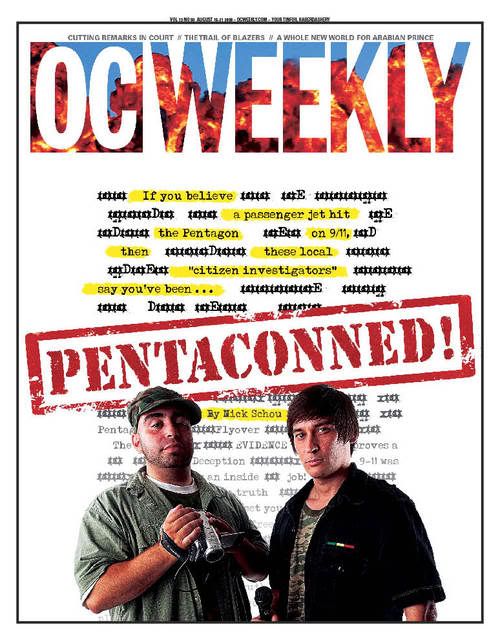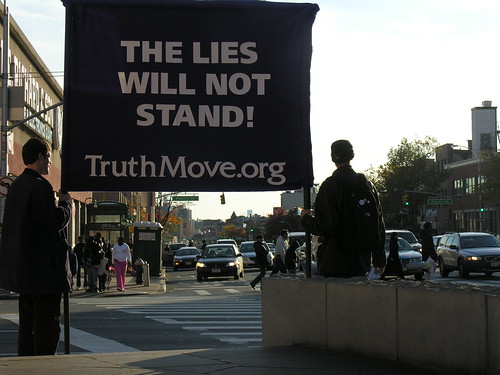 I know of no credible evidence whatsoever linking anyone who is Jewish to the attacks on 9/11. Neither have I seen any highly convincing evidence that Israelis played a significant role. And yet you can't do a search for information on the subject of the attack without running into websites, videos, blogs, and books suggesting that Israel, the Jews, or a global Zionist conspiracy was responsible.
I know of no credible evidence whatsoever linking anyone who is Jewish to the attacks on 9/11. Neither have I seen any highly convincing evidence that Israelis played a significant role. And yet you can't do a search for information on the subject of the attack without running into websites, videos, blogs, and books suggesting that Israel, the Jews, or a global Zionist conspiracy was responsible.The quality of discussion on these topics certainly varies from intentional disinformation to those who honestly while, in my opinion, misguidedly feel that certain topics are worthy of long term academic review or broad public attention. The quality of fact varies just as much. At one extreme we have bigotry and at the other very fact based interest in the actions of the Mossad. Both are a small minority relative to movement participants and the wider public that this movement wants to reach. So it's important for us to be clear with ourselves and with one another about where we draw certain moral and strategic lines.
Disinformation
There is no doubt in my mind that a good deal of the anti-Semitism one can find at the fringes of the movement is intentional disruption. I make this claim based first on knowing that our government is investigating and infiltrating anti-war groups far less challenging to the system than we can be, and second that anti-Semitism has been quite effectively used to undermine our credibility and would therefore be an obvious way to do further damage. Eric Williams and his role in undermining the Arizona Conference is a telling example.
From my own perspective Eric Williams came out of no where and published a series of books about deep politics on topics such as 9/11 and 7/7. After having established some measure of credibility in the movement he took on a role coordinating a 9/11 truth conference in Arizona with other sincere movement activists. Then, just a few weeks before the conference, he published a book about Holocaust denial. The result was highly damaging to the event, those involved, and the movement itself. I have little doubt that Williams meant to undermine the movement. And I sincerely hope that's not true. I haven't heard much about him since.
Bigotry
Of course, a good deal of the anti-Semitism we find is simply home grown bigotry. Between %15 and %20 of the U.S. population have strong anti-Semitic views. And that's based on self reporting which necessarily involves a fair amount of dishonest response. The numbers are significantly higher in other Western countries.
For that reason we should expect to find those with anti-Semitic views in most social groups unrelated to Jewish culture. And if that is the case, it is certainly unfair to point to that overly vocal minority in this movement and suggest that it represents our cause. To do so would demonstrate a good deal of bias toward the movement as one could point that finger at just about any other group.
The point here is that, yes, there are people with anti-Semitic views who also concern themselves with 9/11 truth. But to suggest that these people in any way represent the movement is totally unjustified relative to the great majority of us who find these views abhorrent.
Essential facts?
The final group are those who have done research into the potential role of Israeli intelligence in the 9/11 attacks. There certainly are legitimate facts that support such speculation. And it would be irresponsible to suggest that critique of Israel itself is anti-Semitic. Academic freedom is an essential priority to me. And yet if those facts don't add up to much while they allow for significant misunderstanding a good deal of caution is necessary.
I'm going to go out on a limb here and state a controversial opinion of mine. I believe that much, and certainly not all, of this "honest research" is founded is subtle forms of anti-Semitism. It's not what those involved would ever consider any kind of overt hatred. To put it as plainly as possible, it's comes down to not caring how Jewish people might feel about how information, speculation and opinion is presented. You might call it a cultural insensitivity.
I'm not talking about avoiding the truth because it would hurt someones feelings. But I simply can't find logical cause to focus much attention on a concern that offers the movement very little benefit while potentially insulting those who would otherwise support our cause.
I am NOT saying that everyone curious about this or concerned for a time with exploring the details is a bigot. I'm saying, based on the lack of strong evidence, that extended focus on the issue and its public promotion play into the hands of those who would like to undermine the movement, has the potential to alienate an entire cultural group from the movement, and is therefore not justified merely based on claims of academic rigor.
So this is more than anything else, and as always, about sticking to promoting the best facts we have. Sincere research into the potential role of Israel can certainly be conducted in a culturally sensitive manner. And yet that research does not appear to be very important to the movement's progress while certainly presenting some serious problems.



